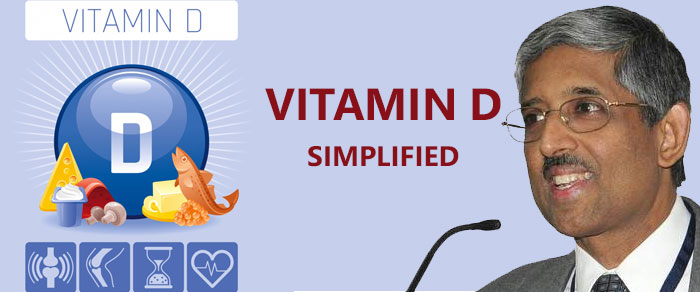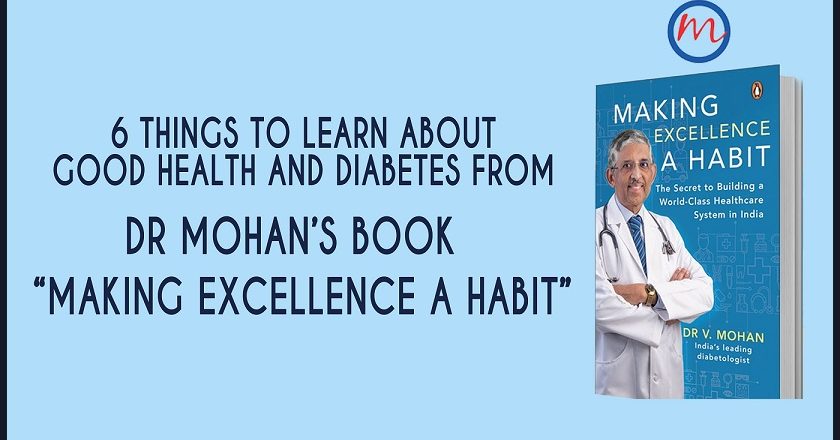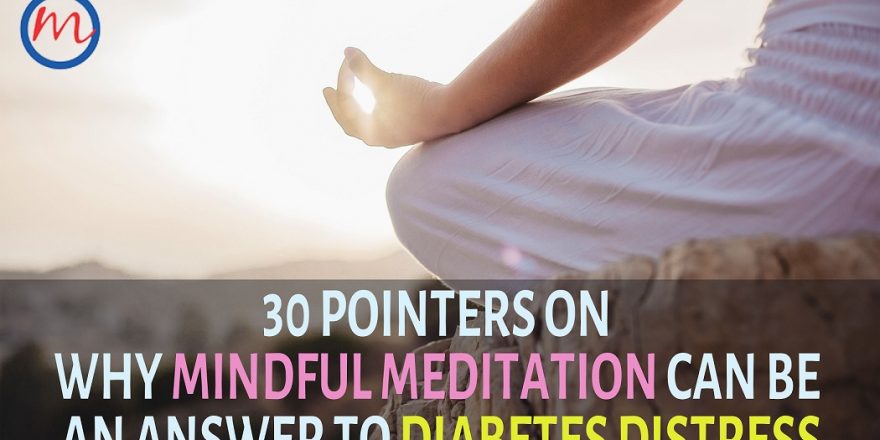DR.V. MOHAN,
Chairman & Chief Diabetologist
Dr. Mohan’s Diabetes Specialities Centre, Chennai, India
Vitamin D, also known as the ‘Sunshine vitamin’ is one of the very important vitamins for human health. It is a fat soluble vitamin and its main function is to maintain normal blood levels of calcium and phosphorus. Vit D is considered to be both a hormone as well as a vitamin. While the role of Vitamin D in bone metabolism and for growth is well known, today we know that it has a far greater role in human health. Vitamin D is present in 2 forms: Ergocalciferol (Vitamin D2) and Cholecalciferol (Vitamin D3). It is Cholecalciferol, which is the naturally occurring form of Vit D which is synthesized in the skin from cholesterol with the help of sunlight. Ergocalciferol is used as food additives.
Vitamin D deficiency is associated with decreased immunity, obesity, diabetes, heart disease and even certain forms of cancer. What has been realised only fairly recently, is that Vitamin D deficiency is ubiquitous in India. In a recent research paper from our centre (Dr. Mohan’s Diabetes Specialities Centre) , published in the British Journal of Nutrition, we showed that in Chennai city, 55% of all adults have Vitamin D deficiency and this figure was 63% in those with diabetes and 80% in those with obesity.
So how can those with Vit D deficiency, increase their Vit D levels?
This can be done in 3 ways:
- Exposure to sunlight
- Through food
- Through Vit D supplements
Exposure to sunlight:
Undoubtedly, the sun is the best source of Vitamin D. Regular exposure to the sun, several times a week will usually ensure that one gets enough Vitamin D. However this is not an easy proposition. One needs to spend at least half an hour to several hours in the sun, depending in which part of the world you live in, to get adequate amount of Vitamin D.
What is the mechanism of Vit D formation in the skin?
When your skin is exposed to the sun it makes Vit D from cholesterol. The sun’s ultraviolet (UVB) rays hit cholesterol in the skin cells providing energy for Vit D synthesis.
What are the challenges to get enough Vit D from the sun?
- Time of the day: The best time is when the sun is at its peak ie. around noon, when the UV rays are most intense. Most people especially in India try to avoid the sun at this time
- If you stand near a glass window, the glass cuts out the UV rays.
- Those with darker skin need more exposure to the skin as the melanin pigments which give the dark colour to the skin acts as natural sunscreen. People in India try to avoid the sun to prevent getting darker.
- Those who do go out in the sun, use sunscreens. These contain chemicals which reflect or scatter the sunlight. Sunscreens with SPF 30 or higher decreases Vit D production by over 90 percent.
- Dangers of exposure to sunlight include, sunburn, sunstroke, damage to the eyes, aging of the skin, freckles, moles and even skin cancer.
- People living in temperate climates may not get enough hours of sunshine every day or enough months of sunlight through the year.
What about foods as a source of Vitamin D?
Yes there are some foods which can give you Vitamin D, but most of them are from animal sources and for vegetarians, the choice is rather limited.
Food sources of Vit D include: Fatty fish like swordfish, mackerel, halibut and salmon as well as canned tuna, beef liver, cod liver oil, egg yolk and hard boiled eggs. There are some food which are fortified with Vit D. These include: milk, yogurt, cereals and orange juice. The main vegetarian source of Vit D is some forms of mushrooms like shiitake ,portobello and raw white mushrooms (especially those that have been treated with UV light).
If one is Vit D deficient, can it be corrected by supplements?
Yes. Its actually quite easy and relatively inexpensive.One is normally asked to take Vit D as a powder containing 60,000 international units (IU) . This usually comes in sachets and can be taken, mixed in milk or water, once a week ,for 4 to 8 weeks, depending on how low your Vit D level is. Thereafter it can be takendaily, as a capsule or gel containing 2000 IU. However it is advisable to take it only with a doctor’s prescription, as there could be some contraindications, eg. those with kidney disease etc. Usually they need to be continued for a long time as they are replacing a deficiency in the body.
Remember that Vit D deficiency can reduce your natural immunity. Hence in these days of COVID 19 scare, it is better to see that your Vitamin D levels are maintained normal. Ask your doctor about Vitamin D!



